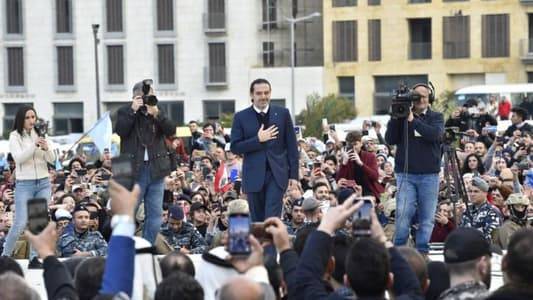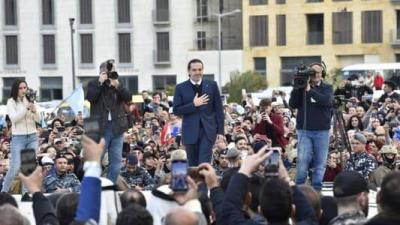Despite the deterioration the country has reached on all levels, the temporary return of former Prime Minister Saad Hariri will remain a hot topic. His steps will be closely monitored, including his meetings and positions on which to build. In absence as much as in presence, Hariri occupies a significant space of interest. His brief visit was filled with many encounters with politicians and media figures. A non-political visit with a politically heavy impact, particularly regarding the people who surrounded him around the shrine up to his residence in Al-Bayt Al-Wasat.
The scene of Hariri's return to Al-Bayt Al-Wasat begins at the entrance of the "radiant street" unlike usual. The "guard youth" look relieved, their voices loud, not hiding their joy. They have returned in numbers, and they have not changed. The same scene repeats itself until the entrance of the house. Inside, the former Prime Minister's residence is bustling with visitors, in a scene that is no longer common, even in official headquarters.
To commemorate his father, the martyr Rafik Hariri, Saad Hariri chose to return "as a citizen," but they insisted on meeting him as a leader. Is it eagerness for what he represents and who he represents, or did people feel that the ghost of "the companion" was soaring again, and thus they joined him?
He entered the guest hall smiling, relaxed, as if he were proving his liberation from the shackles of power and its responsibilities. He stated frankly, "How beautiful it is to return when you don’t have to make a decision." In the few minutes he spoke, he delivered more than one message and expressed various grievances and blame—towards his old allies and those who used their war against him in the name of sect rights, to the point of exhausting and nullifying the sect.
He refuses to talk in sectarian terms and places the Sunni sect in its natural national position, willing to participate in the presidential election whenever candidates are found. Hariri withdrew from the political scene to make way for the youth generation. He believed others would follow his lead, but the reality is that he chose to be outside the equation while others continued to play their political roles. Hariri does not regret his decision to withdraw. If he had not, the same old scenario would have repeated: the assignment, then retraction, or naming someone to represent him, leading them back into the bazaar of forming a government. He removed himself from direct political follow-up and distanced himself, leaving those who remained after him accused of bringing the country to its current state.
His speech was general, yet it was not devoid of long-term political content aimed at many without naming anyone. "I will not talk about politics because I have suspended my political work," said Hariri, indicating that this decision "will remain for the reasons that brought us to where we are now." He added, "I had nothing to offer in politics, and I could see where we would end up, and I could not do anything." Hariri has returned "to the people and to work with them," believing that "politics is not everything; what matters most is the people. Politics is a tool for achieving accomplishments, while the people are the foundation." He continued, "I left political work because I am not one of those who say 'I can't and I don't want to,' and I made space for the youth generation that demanded change in the October 17 Revolution. Everyone in power should have done the same because they failed to manage the country, yet they remained in their positions," directing his accusation towards "the existing class that has not succeeded and has brought the country to this state due to mismanagement."
In his view, "there is no poor country in the world; it becomes so due to mismanagement. Lebanon is not a poor country; it is very rich. What is important is that we understand how to improve its management for the benefit of the people, for they are Lebanon’s guarantee because of their belief in it and that everything Rafik Hariri did was for the benefit of the country."
Hariri rejects discussing the fragmentation of the Sunnis, asking, "Is the political component obstructing the election of the president? When a presidential candidate is present, the Sunni component will surely choose, but the problem lies in the other components that are fighting their battle under the banner of defending the rights of the sect." Everyone who decided to protect the rights of the sect "burned its religion," describing "confessionalism" as a tasteless novelty aimed at "obstruction."
Hariri also recalled those who used him "as a scapegoat, whether he was in power or outside it," touching on the period of political Hariri that began in 1992 when Rafik Hariri initiated Lebanon's reconstruction. "His opponents used every means to politically, sectarianly, and religiously confront him, and when they failed, they killed him. Those who killed Hariri continue to practice the policy of obstruction today."
Hariri maintains that he will keep "this house open" and that work will focus on the associations and "the Future Movement," without specifying a date. The man who has transitioned from the political realm to business observes how Lebanese are achieving remarkable successes abroad. As for the timing of his return to Lebanon and whether he is willing to take a step forward, he answered with a laugh, "The steps are still backward. When I take a step forward, say 'God!'"




